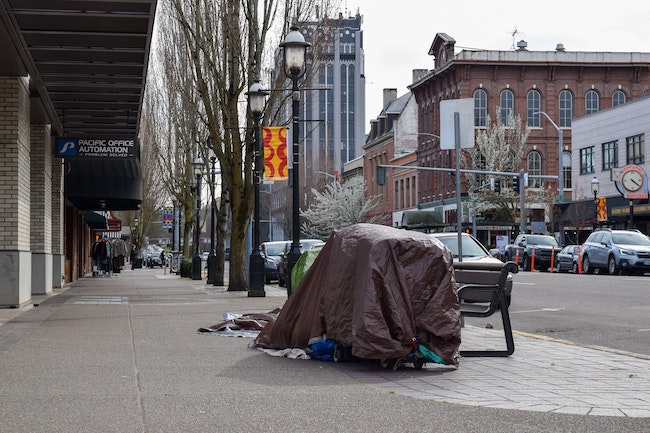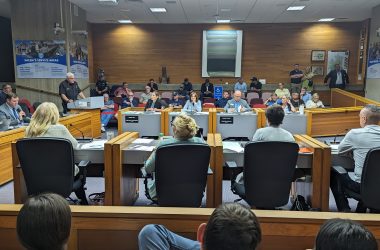 A homeless person sets up a tarp along a downtown street in March, 2020. (Saphara Harrell/Salem Reporter)
A homeless person sets up a tarp along a downtown street in March, 2020. (Saphara Harrell/Salem Reporter)
Legal advocacy group Disability Rights Oregon wrote a letter to the Salem City Council and Mayor Chuck Bennett Tuesday, arguing that the city is using the coronavirus pandemic to push homeless people out of downtown in ways they say violate constitutional protections against cruel and unusual punishment.
The group argues the city’s emergency declaration has the practical effect of enacting an ordinance that prohibits people from sitting or lying on the sidewalks during the day.
Salem City Council voted 8-1 to pass a sidewalk conduct ordinance, known as ‘sit lie,’ in March, but it can’t go into effect until certain conditions are met, like adequate day space and public restrooms.
But on March 17, Salem city councilors unanimously declared an emergency prohibiting gatherings of two or more people on any public space within the city and limited those areas to “active pedestrian use.” Public gatherings are defined as two or more people remaining in the same area for ten minutes or more.
“Despite the ordinance’s purported promise ‘to ensure that the restrictions in this ordinance are not enforced until the opening of additional daytime space that is protected from the elements and includes access to toilets,’ the city already shirked that commitment with a no “public gathering” emergency resolution that effectively enacted the sit-lie ordinance immediately,” the letter from Disability Rights Oregon said.
DOCUMENT LINK: Letters to mayor, Salem City Council from Disability Rights Oregon
The emergency declaration was set to expire on April 28, but councilors voted to extend it until June 30.
Matt Serres, a lawyer with Disability Rights Oregon who penned the letters, said the advocacy group felt Salem pushed through an emergency ordinance that prohibited loitering while the public was consumed with the unfolding pandemic.
“Our ultimate goal has been all long that the city of Salem should change its practices,” Serres said. “We feel that the city of Salem should be looking to expand shelter space instead of criminalizing the activity (of being homeless.)”
Salem Police Lt. Treven Upkes said he doesn’t know of anyone who has been cited for trespassing for refusing to move from downtown streets. Police have been asking homeless people to move to Wallace Marine or Cascades Gateway parks, where camping in unimproved areas has been permitted during the emergency.
Mayor Chuck Bennett said the issues raised in the letter are the opinion of the advocacy group and don’t exemplify the city’s actions.
“I don’t know that (Serres) knows what’s going on here except by hearsay,” he said.
Bennett said he can see why it looks like the city used the COVID-19 crisis to backdoor a sit-lie ordinance. But he said the city needed to get people congregating under awnings out of downtown to address fears of the coronavirus spreading.
He said opening the parks for camping came at the advice of local homeless service providers.
At the time, Jimmy Jones, executive director of the Mid-Willamette Valley Community Action Agency, said there weren’t a lot of good options for homeless people during the outbreak.
“Allowing the homeless to camp in Wallace Marine and in Cascades Gateway is the best of limited options available to the city, given the current public health conditions in the downtown, and the high probability of COVID-19 community spread among our homeless neighbors,” Jones wrote to City Manager Steve Powers on March 17.
Emails to Powers and City Attorney Dan Atchison weren’t immediately returned.
Bennett said there’s a lot of work going on behind the scenes to add more shelter beds in Salem.
Have a tip? Contact reporter Saphara Harrell at 503-549-6250, [email protected] or @daisysaphara.









